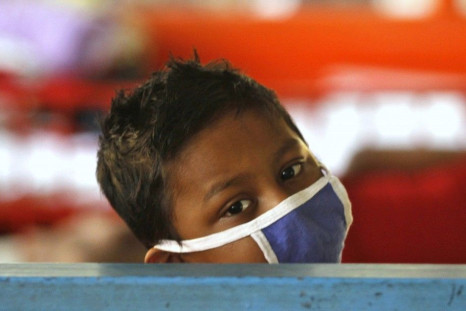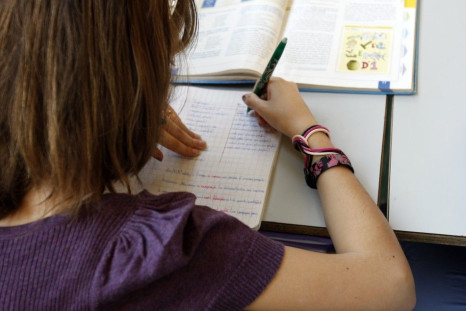Size Matters (For Fonts), Scientists Say
Reading larger words provokes a stronger emotional effect in the brain than the same words presented in smaller type, according to a new study.
The Science Of Coffee Spills: It's All In The Walk
Are you nursing a burn from coffee you spilled on yourself this morning as you rushed from the café to work? Do you have a burning to desire to know why coffee spills seem so unavoidable? Turns out you may have more control over your coffee than you think.
OTC Herbal Supplement Rutin Blocks Blood Clot Formation: Study
Rutin -- a compound that occurs naturally in a number of fruits and vegetables and is sold as an herbal supplement -- has a number of anti-clotting properties, meaning that it holds promise as a treatment for conditions like stroke and pulmonary embolism caused by dangerous blood clots.
How The Horse Was Won: Study Traces Origins Of Equine Domestication
For horses, it's been a long and winding road from the steppes of Eurasia 6,000 years ago to the Kentucky Derby today. A new genetic study sheds light on how early equines expanded geographically before and after they were domesticated by humans.
Dinosaur Farts Could Have Helped Warm Prehistoric Earth
Dinosaur farts and burps could have had a significant effect on prehistoric climate change, according to a new study from a trio of British scientists.
Meat Leaving A Bad Taste In Your Nose? Scientists Find Genetic Explanation For Boar Taint Sensitivity
Pork that comes from uncastrated male pigs is sometimes marred by an odor -- at least for people with two copies of a gene called OR7D4.
Alzheimer's Disease Trigger Mimics Mad Cow Infectious Agent: Study
Our findings open the possibility that some of the sporadic Alzheimer's cases may arise from an infectious process.
Hearing Disability Linked To Poor Touch Sensitivity
Touch and hearing are very distinct, but German scientists have found a possible genetic link between the two sensory systems.
'Oyster-Tecture' In The Big Apple: Could It Clean Up New York Harbor?
Repopulating oyster beds can help clean polluted waterways and provide a healthy habitat for other marine life.
Some Dinosaurs Edging Towards Extinction Before Fateful Asteroid: Study
The asteroid that destroyed the dinosaurs (except for those that went on to become birds) may have just been the final blow for some species that were already on the decline, a new study claims.
Strengthening Silk Bone Grafts: Scientists Work To Harness World?s Strongest Natural Fiber
Engineered bone grafts that use ceramic, glass or even metal to provide a scaffold for new bone cells to grow are thought to be a promising alternative to natural bone. Some researchers are looking to a more unexpected source of material for bone grafts - the larva of Bombyx mori, also known as the the domesticated silkworm.
Drug Trials Neglect Children: New Study
Drug trials tend to ignore child patients who account for a larger proportion of overall disease burden and instead focus on adults, according to new research presented Saturday.
Scientists Reprogram Cells To Heal Broken Hearts
In new animal studies, scientists have succeeded in transforming scar tissue in the heart into muscle cells without the use of stem cells or surgery, raising hopes for better recovery in heart disease patients.
Emergency Helicopter Transport Costly But Life-Saving: Study
Transporting people to hospitals by helicopter is costly - but for one in 65 severely injured patients, it could mean the difference between life and death, according to a new study.
How Does The Coachella Tupac 'Hologram' Work? [INFOGRAPHIC]
The resurrection of rapper Tupac Shakur wowed audiences at the Coachella music festival. But the illusion isn't a hologram, as some have reported -- it's actually a 2-dimensional video cleverly projected using technology based on an old theater trick.
Study Dampens Hopes For Steroid Replacement In Treating Back, Leg Pain
For sciatica patients, the genetically engineered pain medicine etanercept is no better at treating leg and lower back pain than traditional steroid injections, according to a new study.
Would You Like Salt With That? Higher Sodium In Some US Fast Foods, Study Shows
In the US, your fast food probably comes with extra salt, like it or not. A new study shows that the same products at chains like McDonald's can vary wildly in sodium content depending on what country you're in.
Penguin Census Taken From Space
Here are some of the many uses of satellites: anchoring the GPS that powers navigation and geotagging systems in smartphones and cameras. Relaying phone, radio and television signals. And now, helping scientists count nearly 600,000 emperor penguins in Antarctica.
Space Sandstorms Explained: What Happens When Stars Bite The Dust
Astronomers have long known about the superwinds and space sandstorms that herald the deaths of stars, but until now, have been at a loss to explain how they happen.
Fragile X Drug Success In Mice Gives Hope For Autism Treatment
Scientists have found a compound that can reverse the major symptoms of Fragile X syndrome -- the most commonly inherited form of mental disability in boys and a known cause of autism -- in adult mice.
Pigeons Aren’t Led By Their Beaks? New Study Ruffles Some Feathers
Pigeons are thought to navigate by reading the Earth's magnetic fields, but they might not carry their compasses in their beaks, as previously believed.
EKGs Can Help Predict Heart Disease Risk In the Elderly: New Study
Monitoring the electrical activity in the heart could be a good new way to pinpoint heart attack risk in elderly patients and help doctors steer their patients away from coronary heart disease, researchers said in a new study on Tuesday.
Homophobia Linked To Repressed Homosexual Arousal, Authoritarian Parenting
Homophobia is apparently associated with homosexual arousal that the homophobic individual is either unaware of or denies,
Social Stress Molds Immune System For Monkeys -- And Possibly Humans Too
For monkeys, being on top of the social pyramid is likely good for the health - and it could be true for humans, too. Researchers led by a University of Chicago and Emory University team studying social hierarchies in rhesus macaques have found that a monkey's social status appears to influence how her genes are regulated, particularly those genes pertaining to the immune system.
Bering Strait May Help Limit Abrupt Climate Changes: Study
Keeping a 53-mile-wide ocean channel open may be the key to preventing abrupt climate change events, scientists say.
Easter Explainer: The Science Behind Colored Eggs, Amorous Rabbits and Deadly Lilies
Many a child at Easter has been puzzled by the mechanics of a rabbit laying eggs. While it's hard to logically dissect the origins of the Easter Bunny, other symbols of the holiday have some scientific significance.
Can Dyslexia Be Spotted In Children Before They Start Reading?
Dyslexia is the most common type of learning disability and affects somewhere between 5 and 10 percent of the US population. Italian scientists now say that children can display signs of dyslexia even before they begin to read -- a finding that could be used to steer kids into programs that could help stave off the learning disability.
Why Do Insects Cross Their Legs When They Die?
Even though science allows us to peer into galaxies hundreds of millions of miles away and tear atoms apart to look for clues about the origin of the universe, there are still lots of unanswered questions closer to home. Weighty questions such as: why do insects cross their legs when they die? Here, some entomologists speculate on the answer.
Deadly Breast Cancer Has Many Different Faces
A group of scientists has uncovered a startling truth about an especially deadly form of breast cancer: turns out, it's actually a lot of different kinds of breast cancer.
Little Fish Yields Big Insights Into Evolution: What Can We Learn From Stickleback DNA?
At first glance, the three-spined stickleback seems like an unassuming little fish. But now that scientists have unspooled its DNA and opened up its entire genetic library for inspection, the stickleback has proven to be a powerful tool for studying the genetic roots of evolution.




















